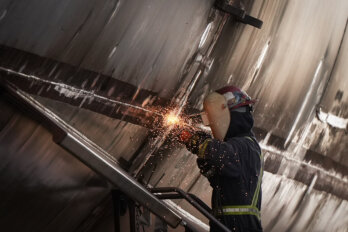Not long ago, Conservative leader Pierre Poilievre’s path to becoming Canada’s next prime minister seemed all but guaranteed. The Liberals were sinking, the Conservatives were surging, and the electorate looked ready for a change. But then US president Donald Trump did what he does: upended everything. With fresh threats of tariffs and even talk of annexation, the Liberals suddenly have a new argument for why they should stay in power. And they’re making a real play for it.
Most of the attention has been on former central banker Mark Carney and former deputy prime minister Chrystia Freeland, both widely assumed to be Prime Minister Justin Trudeau’s successors. But Karina Gould is emerging as a contender. At thirty-seven, she’s already reshaped what leadership in Canada looks like—the youngest woman ever appointed to cabinet, the first to give birth while in office—and now she’s making the case that she’s the one who can beat Poilievre.
I spoke with Gould between campaign stops in Alberta. She laid out her vision for how the Liberals can regain trust, how she plans to take on Trump’s tariffs, and why, in her view, the fight for Canada’s sovereignty is already underway.
What do you say to your critics who accuse your bid for leadership of the Liberal Party of being a way to just get your name out there for a future election?
Is that just what they say about young women as opposed to taking them seriously? It’s funny, but I was reflecting a lot about when I was seeking the member of Parliament nomination in Burlington, and I heard very similar things at that time. I would tell them, “No, I’m running now so that I can win this election.” And they would say, “Oh it’s so nice you’re involved, but we really want an older man with business experience.”
Elections are about the present and the future. I represent a different voice, which, by the way, is a huge constituency in this country: women. I’m a millennial suburban mom. Guess who’s an important voting bloc? Millennial suburban moms. And they are a powerful voting bloc, who, I believe, need to see themselves reflected in leadership.
The main issue on the table this election cycle is the Trump tariffs. The next prime minister will be the one to deal with their implementation. You’ve pledged to include Bill C-282, which will protect Canada’s supply management policy, in your first throne speech.
I feel very strongly about supporting and protecting agriculture—in particular, our supply management sector in Canada. It was an area that was targeted by the Americans previously.
We need to make sure we’re not trading away for entry into our supply management sectors. Supply management does something very important: it provides stability in the market, and it provides economic support in rural areas and creates prosperous rural communities.
One of the things I feel really strongly about is that we can’t just be for urban centres. We have to be for rural communities, and that’s one thing I’ve committed to do.
You’ve recently said that, under the Trudeau government, there are some things you would have done differently. What are your main criticisms of the current Liberal government’s policies?
I’m not going to run away from the good things we’ve done. There’s a lot that I’m very proud of.
As someone who was a member of Parliament and a cabinet minister, and a proud Liberal, I will say we’re not going to win the next election by being Conservative-light. The thing that makes me so proud to be a Liberal is that we don’t stop ourselves from dreaming big for this country. Whether it was the Canada Child Care Benefit, the investments we made in Southern Ontario, or bringing companies like Ford and Dofasco into the Green Transition—which is going to secure thousands of jobs directly at those plants or indirectly in the communities around them.
But there are things that I would have done differently, such as the increase in the capital gains tax last year. I don’t believe that a government should be bringing forward big tax changes like that without being transparent about your plans with Canadians. The basic contract between governments and their citizens is taxation with representation. I don’t think it’s right to make those kinds of big changes without asking the electorate.
The other thing is that we were too slow to act when it comes to affordability. Eventually, we got there, but we spent a lot of time talking about what the economy was doing. The economy is only doing well when it’s doing well for people.
If everyday Canadians are saying, “I’m working hard; I’m doing everything I’ve been told I’m supposed to be doing, but I’m still not able to provide for my family or myself in a way that I was promised to be able to do,” then it doesn’t matter if the macroeconomic picture shows that the economy is growing when people don’t feel like the economy is working for them.
I was trying to push my colleagues to talk more about Canadians as opposed to our debt-to-GDP ratio. Don’t get me wrong. As a government, we should make sure that’s happening, but if we’re not helping Canadians feel that the economy is working for them, well then, we aren’t focused on the right things.
How would you handle the carbon tax controversy?
I’m not going to abandon Canada’s climate change policy. One of the reasons I got into politics in 2015 was because climate change is an existential threat to all of us.
But when I hear Canadians talking about the price on pollution, what they’re really talking about is how expensive things are. It’s not that they’re against climate change: I know that Canadians, regardless of how they feel about the carbon tax, believe in protecting the environment. They believe in clean air to breathe and clean water to drink.
What I have committed to do is to cancel the planned increase in the consumer price on carbon, recognizing that Canadians are saying right now things are expensive and they can’t afford anything else.
But I’m also committed to maintaining the carbon rebates, which could be upward of $1,000 per year. For middle-, low-, and no-income Canadians, that’s a significant amount of money that makes a difference at the end of the day.
I hear colleagues who say we have to increase the industrial price, and I agree that big polluters need to pay their fair share. But that won’t be good for industries, and they will just add those costs down to consumers. It’s not a real solution, in my opinion.
And right out of the gate, I would increase the rebate for Canadians who purchase electric vehicles, hybrid vehicles, and gas hybrid vehicles.
The other thing that I talked about is that I want to bring back the Home Energy Retrofit Program to help Canadians green their homes. We know that a large part of emissions come from our buildings. We know that where people are feeling the pinch is on home energy costs. I am in Alberta right now, and it’s minus forty-three degrees! So I want to ensure that we’re doing everything we can to help Canadians lead and live comfortable lives, but in a way that reduces their emissions and also reduces their bills at the end of the month. Let’s help Canadians make the choices they want to make.
Your fellow candidate Ruby Dhalla (who has since been disqualified from running for Liberal leadership) has said that she would deport illegal immigrants. Do you agree?
Well, I’m not sure that we should be scapegoating vulnerable newcomers to Canada. I have said that I am very supportive of reducing our immigration levels. We need to ensure that we have a fair and well-managed system when it comes to immigration. But I think the language she is choosing to use is both sensationalist and not accurate in terms of what the real issues are in Canada. I would not pursue that kind of rhetoric, because it’s not appropriate and it’s not accurate.
All that being said, we need to ensure that our system is fair, well-managed, and we’re ensuring that people who are here are here legally and that they are contributing meaningfully to Canada.
Liberals have been doing better in the polls since President Trump threatened tariffs and doubled down on the idea that Canada should become their fifty-first state, but that doesn’t take away from the trust issues Canadians have with the party.
I understand that. I’m really the only leadership candidate who has talked about acknowledging that we’ve lost trust with Canadians.
Part of rebuilding that trust is listening to what Canadians are telling us. I think what Canadians are very clearly saying is they don’t feel comfortable with Pierre Poilievre and the Conservatives dealing with Donald Trump because Poilievre is kind of the same as Trump. He repeats the same slogans. A couple of weeks ago, when Trump was threatening our sovereignty, Poilievre was like: do whatever Trump wants. He wasn’t willing to stand up for Canada. I think that has really sharpened people’s minds about the decisions they’re going to have to take in the upcoming election.
When it comes to standing up for Canada, the Liberal Party has always done that. People trust us when it comes to Trump: they saw how effectively we handled him the first time. We came out ahead on NAFTA. We got the steel and aluminum tariffs removed. We stood up for Canadian values at a time when the US was pulling back.
But what we didn’t do as well as we should have over the past couple of years is focus on inflation. At the end of the pandemic, we were very focused—and in many ways, I understand why—on how successfully we stewarded the country through COVID-19. But when inflation was getting out of control, Canadians were saying: things are not okay. Mortgage rates were doubling, grocery prices were skyrocketing, and people were having trouble making ends meet. Our response was: but look how good a job we did on COVID.
Canadians were telling us what they needed, and they were asking us to do something, and we didn’t respond in a timely way following the pandemic when it came to the affordability crisis. Eventually we got there, but it took us too long. That’s something I have reflected on a lot over the past couple of years. It’s also why the policies that I have put out have been focused on making life more affordable and tackling issues that matter to Canadians, whether it’s groceries and essentials or housing.
That’s where I have to give credit where it is due: Pierre Poilievre has understood that anger and frustration. Where I disagree with him is that he’s not actually putting forward solutions to tackle those problems.
The Liberals have been in government for a decade, and it’s perhaps expected on some level that they would be out of touch. How do you respond to that? Why would the change in leadership of the party be enough—especially when so many Canadians feel so disillusioned and believe the country needs an entirely new government?
If I’m being very honest, I don’t know if it’s just enough to have a new leader. We still have a lot of work to do throughout the party to do that reconnection.
I have certainly heard from a lot of people—not only Liberals—about how offside Poilievre is to core Canadian values. His idolization of Trump and Elon Musk is worrying for Canadians. They just don’t feel that Poilievre is the person to protect Canada at a time when it needs to be protected.
Being here in Alberta is also very interesting, because, again, we have a premier who wants to break up the Canada Pension Plan and literally take money away from Canadians. We’ve heard nothing from Poilievre on that. Yes, he has a big mouth when it comes to Justin Trudeau, but when it comes to actually defending Canada’s sovereignty or saving programs Canadians rely on, he’s absolutely silent.
So I think it’s giving Canadians a chance to look at Liberals as a real option in the upcoming election. There’s a lot to acknowledge in the past ten years, but we need to demonstrate to Canadians that we hear what their issues are and that we will be different in addressing those issues.
This interview has been edited for length and clarity.





